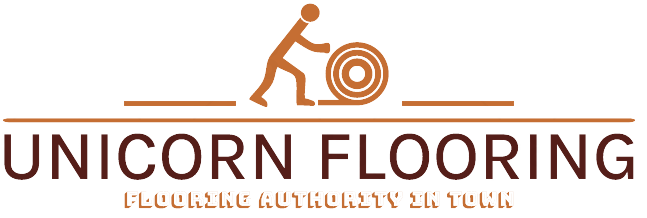Commercial Flooring in Pakistan
The floor beneath your feet in any commercial space does more than just provide support — it shapes first impressions, ensures safety, enhances durability, and affects maintenance costs. In Pakistan’s evolving business landscape, commercial flooring has become a strategic choice for offices, malls, restaurants, warehouses, hospitals, and educational institutions.
Whether you are designing a new facility or renovating an existing one, choosing the right flooring system is essential to achieve both functionality and aesthetics. This detailed guide explains everything you need to know about commercial flooring in Pakistan — types, materials, benefits, costs, maintenance, and key factors to consider before installation.
What Is Commercial Flooring?
Commercial flooring refers to durable and high-performance floor systems designed for non-residential spaces — areas exposed to high foot traffic, heavy loads, or strict hygiene requirements. Unlike residential flooring, which prioritizes comfort and appearance, commercial floors emphasize strength, safety, and longevity.
A good commercial floor in Pakistan should be:
- Durable – able to withstand daily traffic and equipment movement.
- Easy to clean – ideal for hotels, offices, and hospitals.
- Aesthetically appealing – reflecting brand image.
- Slip-resistant – ensuring safety in public zones.
- Cost-effective – balancing upfront cost and lifespan.
Growing Demand for Commercial Flooring in Pakistan
Pakistan’s infrastructure boom — including new malls, hospitals, educational institutions, logistics warehouses, and co-working spaces — has created a huge demand for reliable commercial flooring systems. Cities like Karachi, Lahore, Islamabad, Faisalabad, and Multan are witnessing rapid growth in retail and industrial sectors.
Some driving factors include:
Urban development and modernization – high-rise commercial complexes and smart buildings.
Expansion of the hospitality and retail sector – hotels, restaurants, and malls require hygienic and attractive floors.
Healthcare and pharma growth – hygienic, anti-bacterial, and seamless floors.
Industrial and logistics hubs – durable epoxy or polyurethane floors for heavy load zones.
Corporate culture growth – modern offices prefer minimalistic, noise-reducing floors.
Types of Commercial Flooring in Pakistan
Commercial spaces differ in purpose — and so do their flooring requirements. Below are the most popular flooring materials used across Pakistani businesses today:
1. Epoxy Flooring
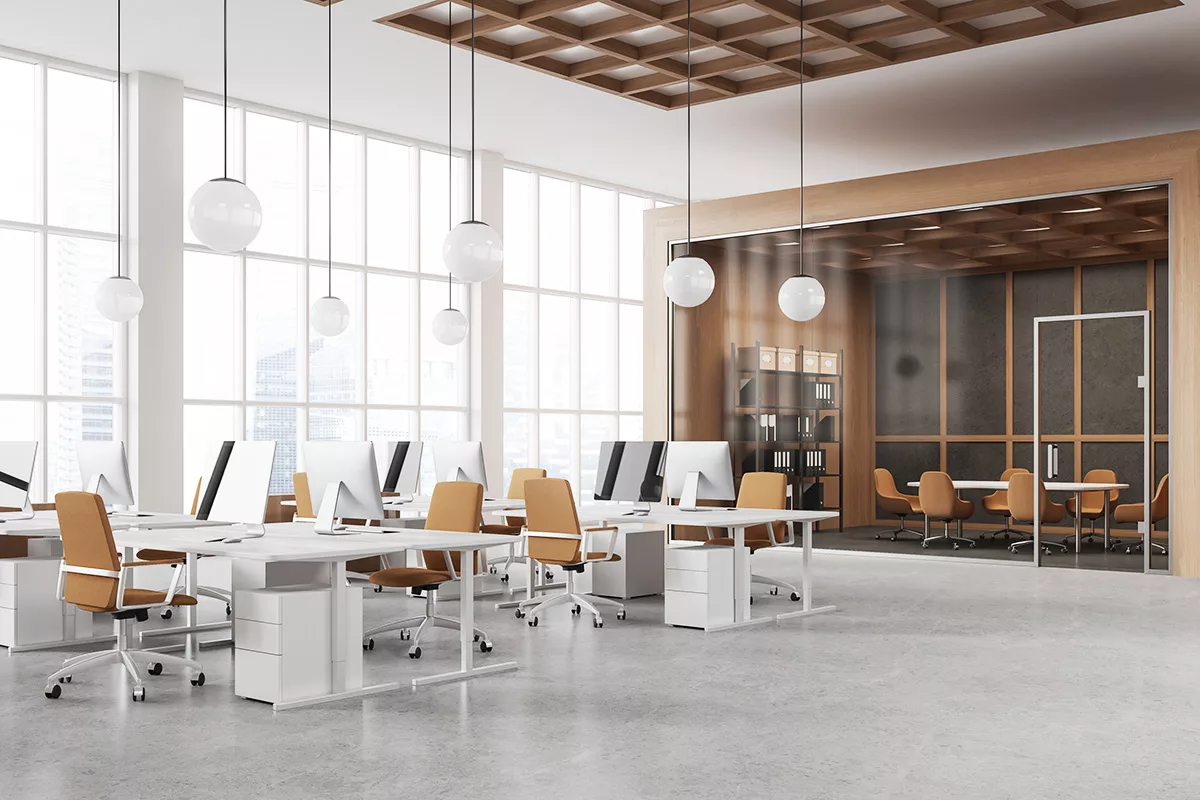
Overview
Epoxy flooring is one of the most preferred commercial flooring systems due to its seamless finish, glossy appearance, and high durability. It’s made by mixing resin and hardener to create a strong, chemical-resistant coating.
Best for
Showrooms, warehouses, offices, schools, hospitals, and parking areas.
Benefits
- Seamless and easy to clean
- Resistant to chemicals, oils, and stains
- Highly durable under traffic
- Available in glossy or matte finishes
- Customizable in colors and patterns
Drawbacks
- Requires professional installation
- Slippery when wet unless textured
2. Polyurethane (PU) Flooring
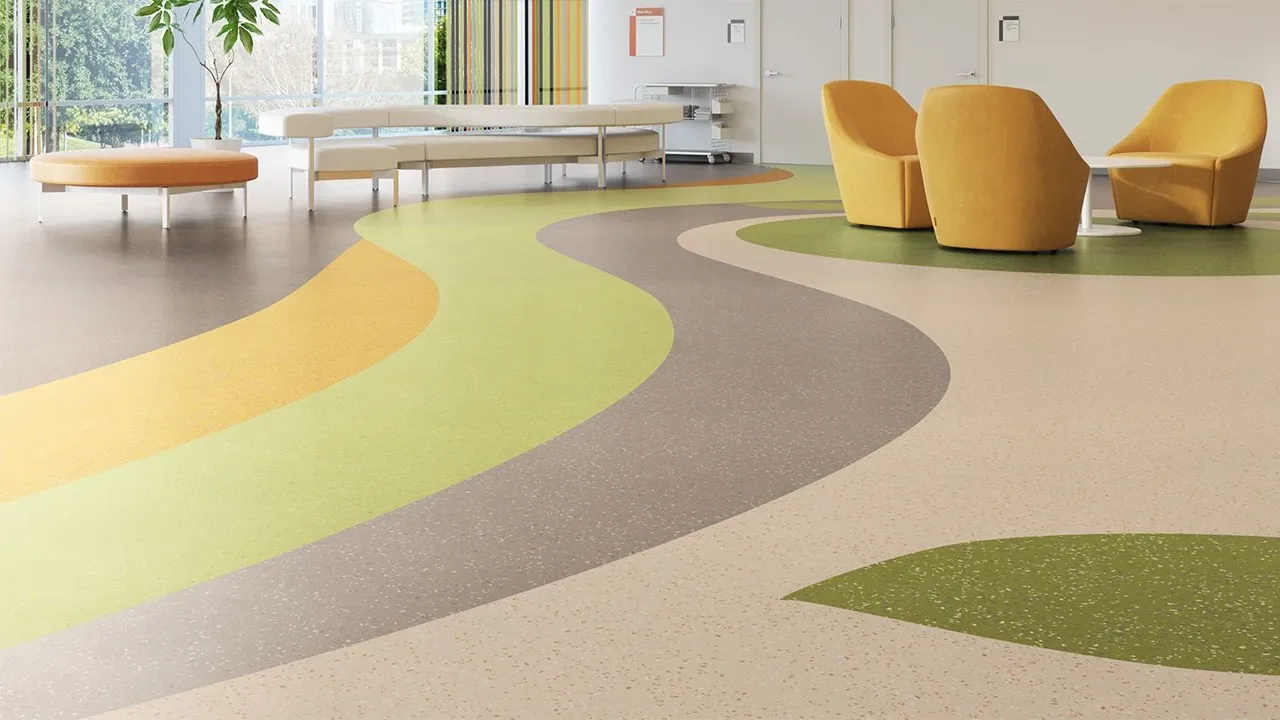
Overview
Polyurethane flooring is another resin-based system known for its flexibility and resistance to thermal shock. It’s ideal for environments exposed to temperature variations or heavy mechanical loads.
Best for
Commercial kitchens, food processing units, cold storage, and outdoor parking areas.
Benefits
- UV and weather resistant
- More flexible than epoxy
- Handles high and low temperatures well
- Long service life
- Easy to maintain
3. Vinyl Flooring
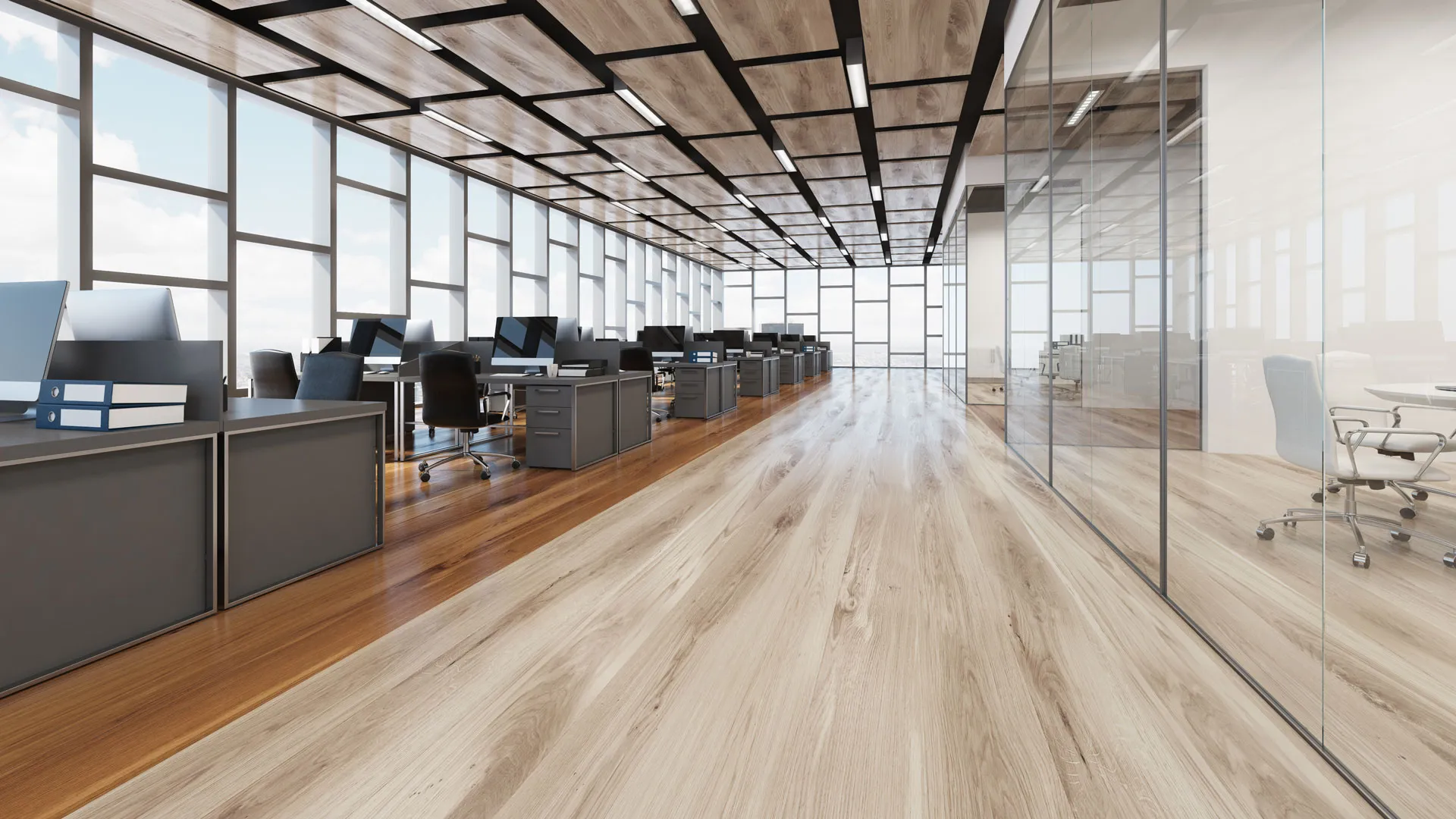
Overview
Vinyl flooring is a cost-effective and stylish option for commercial interiors. Available in rolls, sheets, or tiles, it mimics wood, stone, or ceramic designs while offering water resistance.
Best for
Retail shops, offices, hospitals, schools, restaurants.
Benefits
- Wide range of designs and colors
- Comfortable underfoot
- Sound absorbing
- Moisture resistant
- Easy to clean and maintain
Drawbacks
- Can dent under heavy loads
- Requires regular polishing in high-traffic areas
4. Ceramic and Porcelain Tiles


Overview
Tiles remain one of Pakistan’s most commonly used flooring materials. Modern commercial tiles offer durability, slip resistance, and high design flexibility.
Best for
Shopping malls, restaurants, banks, showrooms, lobbies.
Benefits
- Available in endless styles and finishes
- Scratch and water resistant
- Easy to clean
- Ideal for indoor and outdoor spaces
Drawbacks
- Grout lines can trap dirt
- Can crack under impact if not properly installed
5. Polished Concrete Flooring
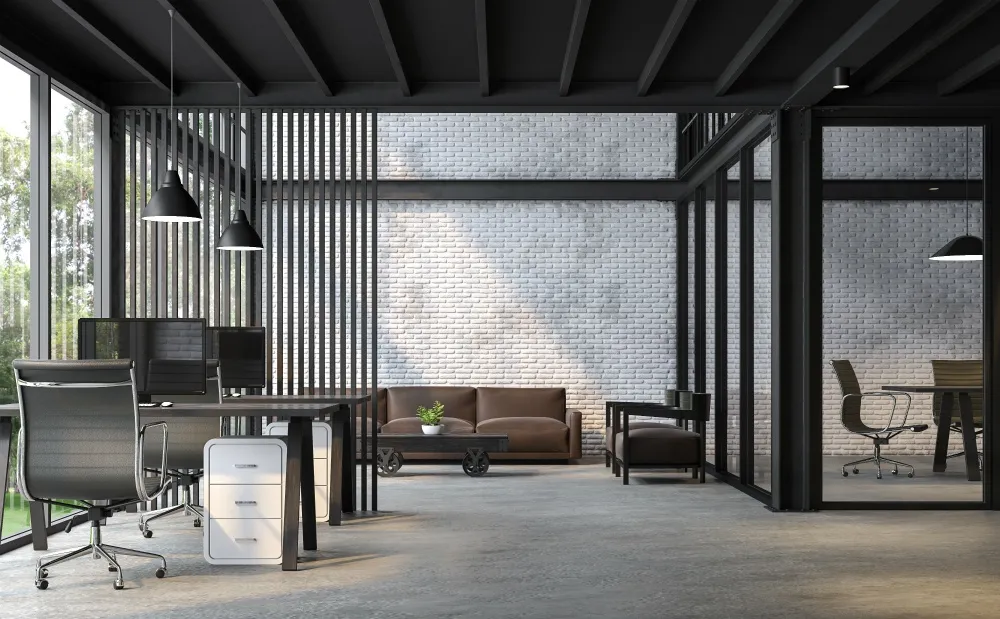
Overview
A growing trend in Pakistan’s modern architecture, polished concrete combines industrial toughness with a sleek aesthetic. It’s both sustainable and low maintenance.
Best for
Offices, warehouses, showrooms, factories, and retail stores.
Benefits
- Long lifespan (up to 20 years)
- Reflective surface improves lighting
- Low maintenance
- Eco-friendly and cost-effective
Drawbacks
- Hard underfoot
- May require sealing against stains
6. Rubber Flooring
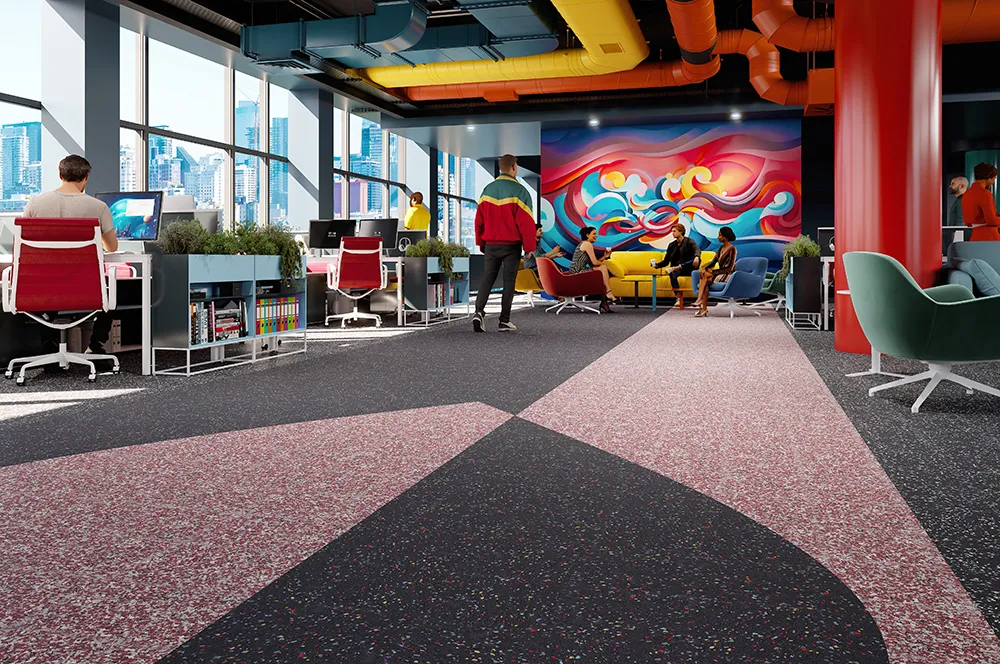
Overview
Rubber floors are designed for safety, comfort, and shock absorption. They are non-slip and reduce noise, making them popular in fitness centers and educational institutions.
Best for
Gyms, schools, playgrounds, hospitals, laboratories.
Benefits
- Slip-resistant and soft underfoot
- Absorbs impact and noise
- Easy to clean
- Anti-static and eco-friendly options available
7. Carpet Tiles
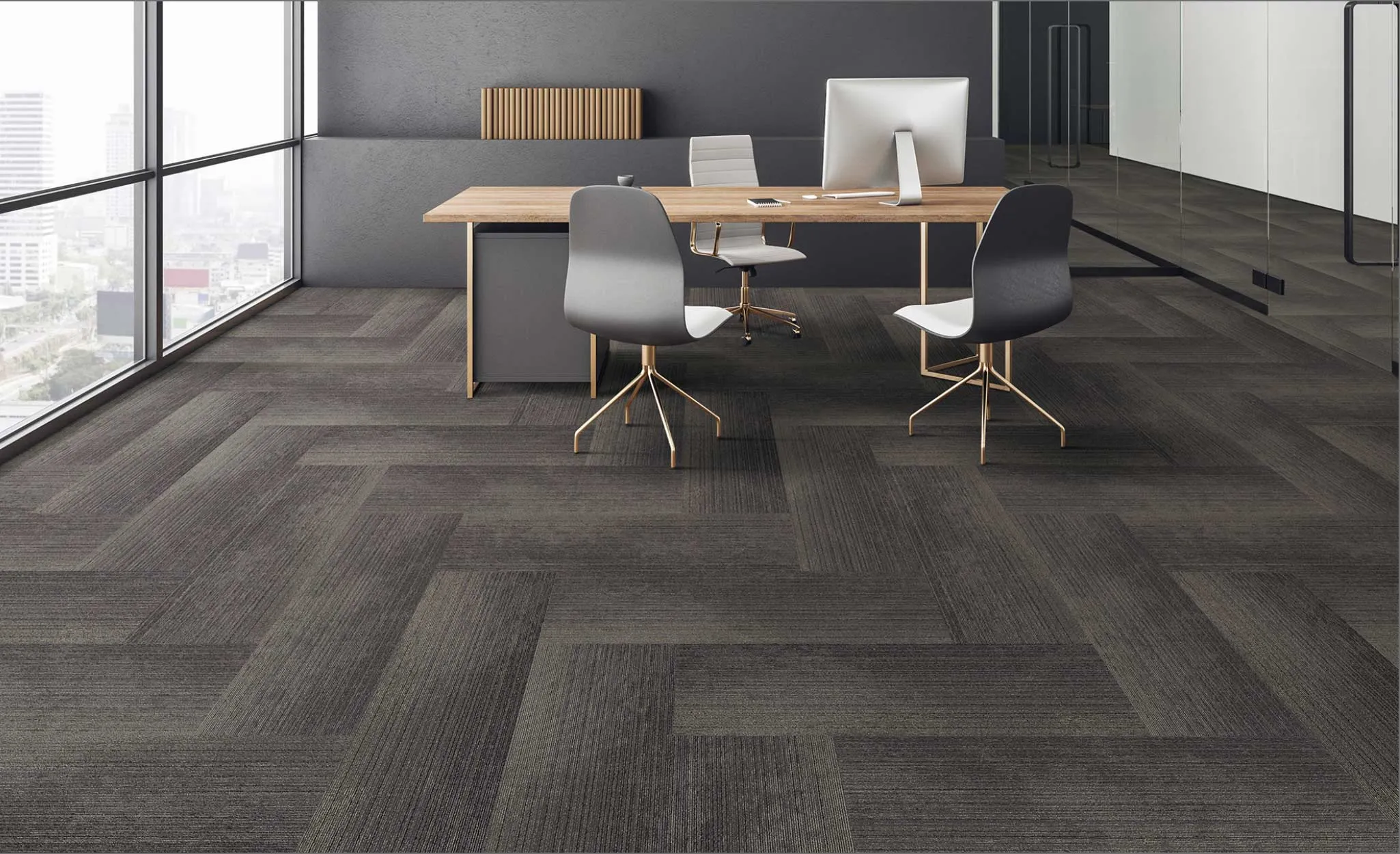
Overview
Carpet tiles combine comfort and design flexibility. Unlike traditional carpets, they’re easy to install and replace.
Best for
Corporate offices, hotels, educational institutions, libraries.
Benefits
- Provides acoustic comfort
- Warm and stylish
- Individual tiles can be replaced
- Available in modular designs
Drawbacks
- Not suitable for wet areas
- Can trap dust without regular cleaning
8. Hardwood and Laminate Flooring
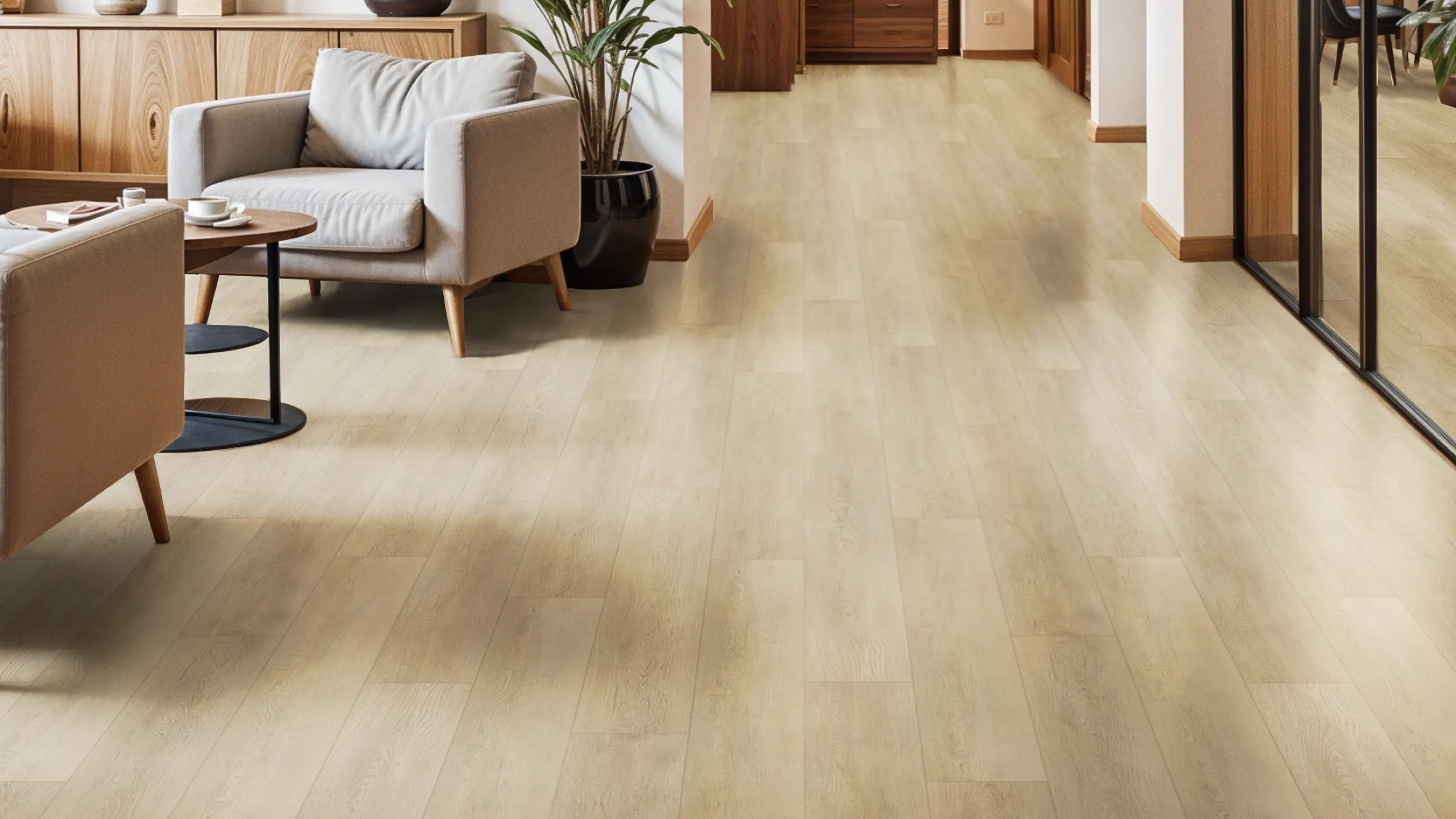
Overview
For luxury commercial interiors, hardwood or laminate flooring adds elegance. Laminate is a cost-friendly alternative offering the wood look with easier maintenance.
Best for
Executive offices, boutiques, hotel lobbies, restaurants.
Benefits
- Natural appearance and warmth
- Easy to clean and replace (laminate)
- Adds value and aesthetics
Drawbacks
- Sensitive to moisture
- Requires professional installation
Comparison Table: Commercial Flooring Types
| Flooring Type | Durability | Maintenance | Cost (PKR/sq.ft.) | Best For |
|---|---|---|---|---|
| Epoxy Flooring | High | Low | 400 – 1500 | Industrial, offices, hospitals |
| PU Flooring | Very High | Low | 700 – 1800 | Kitchens, warehouses |
| Vinyl Flooring | Medium | Easy | 250 – 800 | Offices, retail, schools |
| Ceramic Tiles | High | Moderate | 250 – 1000 | Malls, restaurants |
| Polished Concrete | Very High | Very Low | 300 – 1200 | Showrooms, factories |
| Rubber Flooring | Medium | Easy | 500 – 1500 | Gyms, schools |
| Carpet Tiles | Medium | Moderate | 350 – 900 | Offices, hotels |
| Laminate/Wood | Medium | Moderate | 600 – 2000 | Boutique spaces |
(Prices are indicative and may vary by region and contractor.)
Key Factors to Consider Before Choosing Commercial Flooring
Traffic Level:
Estimate how many people or machines will move over the floor daily. Heavy traffic areas require stronger materials like epoxy or concrete.Aesthetics:
The floor should match your brand identity — warm tones for hospitality, sleek finishes for offices, and bright patterns for retail.Safety:
Slip resistance is critical in hospitals, kitchens, and public walkways.Maintenance Requirements:
Choose materials that are easy to clean and don’t require frequent polishing or waxing.Moisture Resistance:
For humid environments, vinyl, epoxy, or PU floors are better than wooden or carpet floors.Budget & Lifespan:
Consider not just installation cost but also maintenance, repair, and replacement frequency.Installation Time:
If your business cannot afford long downtimes, quick-cure systems like MMA or vinyl tiles may be more suitable.
Installation Process for Commercial Flooring
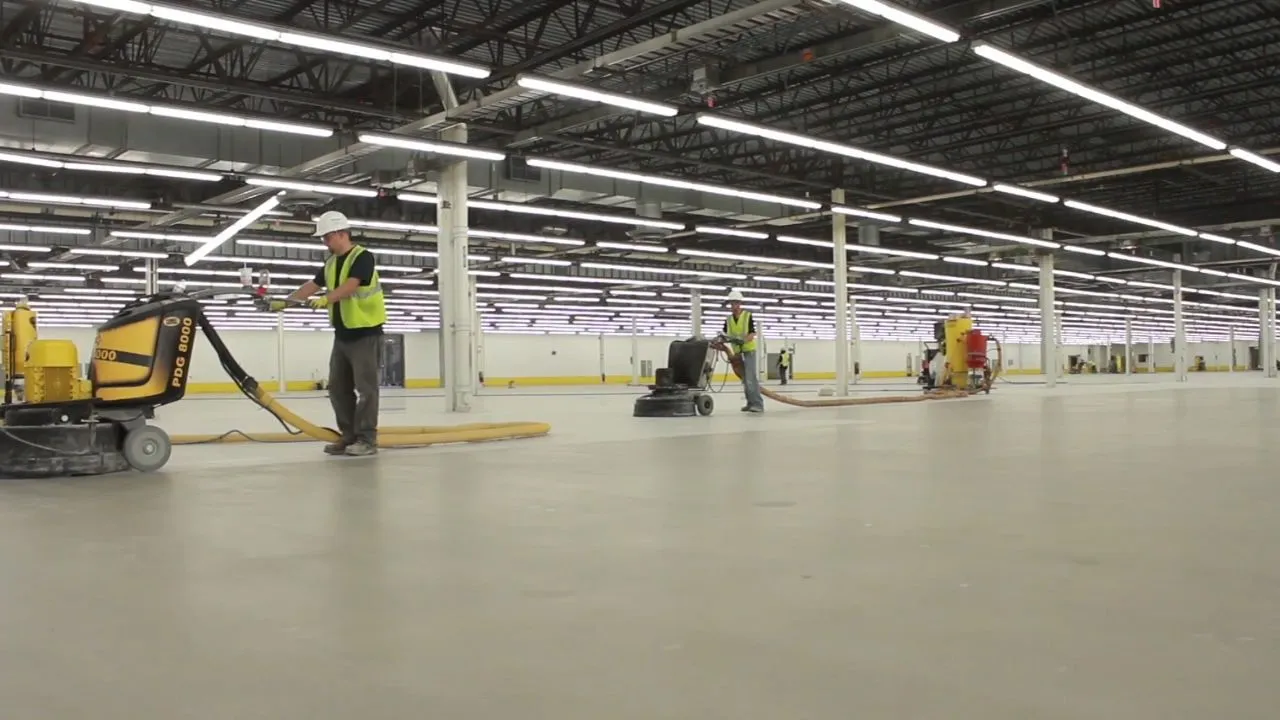
Proper installation determines how long your floor will last. Here’s a simplified outline followed by most contractors in Pakistan:
Surface Preparation:
Cleaning, leveling, and repairing cracks to create a uniform base.Moisture Testing:
Essential before epoxy or PU flooring — high moisture can cause blistering.Primer Application:
Improves adhesion and seals the substrate.Main Coating or Topping:
Applying epoxy, PU, or other material in multiple layers to achieve desired thickness.Finishing & Sealing:
Protective coatings, polishing, or texturing as per design.Curing & Inspection:
Allow proper curing time before opening for use.Final QA:
Contractors often perform gloss, adhesion, and slip-resistance tests before handover.
Benefits of Quality Commercial Flooring
- Enhances Brand Image: A clean, stylish floor makes a lasting impression on visitors and customers.
- Improves Safety: Slip-resistant and smooth finishes reduce accidents.
- Lowers Maintenance Costs: Durable floors require minimal upkeep.
- Long-Term Investment: High-performance floors can last decades with proper care.
- Supports Hygiene Compliance: Seamless, easy-to-sanitize floors meet health and safety standards.
Common Problems and Their Solutions
| Problem | Cause | Solution |
|---|---|---|
| Cracks in floor | Poor substrate preparation | Ensure grinding and priming before coating |
| Peeling or bubbling | Moisture under surface | Use moisture barrier and test concrete |
| Slippery surface | Glossy finish without texture | Add anti-slip additives or topcoat |
| Stains or discoloration | Chemical spills or UV exposure | Apply chemical-resistant, UV-stable coatings |
| Uneven surface | Incorrect leveling | Use self-leveling compounds during prep |
Maintenance Tips for Long-Lasting Commercial Floors
Regular Cleaning: Sweep and mop daily to prevent dust accumulation.
Use Appropriate Cleaners: Avoid harsh acids or bleach unless approved for your flooring type.
Periodic Polishing/Recoating: Extend lifespan and maintain shine.
Repair Small Damages Promptly: Prevent them from spreading.
Use Floor Mats: At entrances to minimize dirt ingress.
Schedule Professional Inspections: Every 12–18 months for resin or tile systems.
Cost of Commercial Flooring in Pakistan
The price varies depending on the flooring type, area size, and preparation work. Approximate cost ranges:
- Epoxy Flooring: PKR 400 – 1500 per sq.ft.
- PU Flooring: PKR 700 – 1800 per sq.ft.
- Vinyl Flooring: PKR 250 – 800 per sq.ft.
- Polished Concrete: PKR 300 – 1200 per sq.ft.
- Ceramic Tiles: PKR 250 – 1000 per sq.ft.
- Rubber Flooring: PKR 500 – 1500 per sq.ft.
- Carpet Tiles: PKR 350 – 900 per sq.ft.
(Always confirm updated prices from your local flooring contractor in Karachi, Lahore, or Islamabad.)
Top Industries Using Commercial Flooring in Pakistan
- Corporate offices & co-working spaces
- Hospitals & laboratories
- Schools, colleges & universities
- Shopping malls & showrooms
- Restaurants, cafés & hotels
- Factories & warehouses
- Banks & government buildings
- Airports & transport terminals
Each sector demands different performance standards — from aesthetics and hygiene to heavy-duty endurance.
Popular Cities for Commercial Flooring Projects
- Karachi – Industrial, corporate, and retail flooring demand.
- Lahore – Commercial complexes, offices, and hospitality flooring.
- Islamabad – High-end corporate and government facilities.
- Faisalabad – Textile and industrial flooring.
- Multan & Peshawar – Growing retail and healthcare sectors.
Sustainability and Green Flooring Trends
With growing environmental awareness, many businesses in Pakistan now prefer eco-friendly flooring options such as:
- Polished concrete (no adhesives, low VOCs)
- Recycled rubber floors
- Low-VOC epoxy systems
- Bamboo or cork flooring (in dry indoor spaces)
Sustainable flooring not only reduces carbon footprint but also aligns with corporate social responsibility goals.
Why Choose Professional Flooring Contractors
A professional commercial flooring contractor ensures:
- Proper substrate testing and preparation
- Correct installation process
- High-quality materials
- Long-term warranty and support
- Compliance with safety standards
Choosing certified installers reduces future repair costs and ensures the floor meets business and regulatory expectations.
Conclusion
Commercial flooring in Pakistan is more than an architectural feature — it’s an investment in safety, appearance, and longevity. From epoxy and PU floors for industrial units to vinyl and carpet tiles for modern offices, the right choice transforms a workspace both visually and functionally.
Always consider your business needs, traffic levels, and environment before choosing the flooring material. With proper installation and maintenance, your floor can last for decades — reflecting the strength and professionalism of your brand.
Whether you’re building a new corporate office in Islamabad, renovating a retail outlet in Karachi, or designing a hospital in Lahore, the right flooring system lays the foundation for lasting success.
FAQ'S
Epoxy and polyurethane floors are ideal for heavy-duty commercial and industrial areas, while vinyl and carpet tiles suit offices and retail spaces.
Depending on material and maintenance, commercial floors last between 10 to 20 years, with epoxy and PU being the most durable.
Yes, epoxy flooring is now available in elegant matte and metallic finishes, making it suitable for offices, showrooms, and malls.
Seamless epoxy, PU, or heat-welded vinyl flooring due to their hygiene, chemical resistance, and easy cleaning properties.
Costs range between PKR 250 – 1800 per sq.ft., depending on material, area size, and installation complexity.
